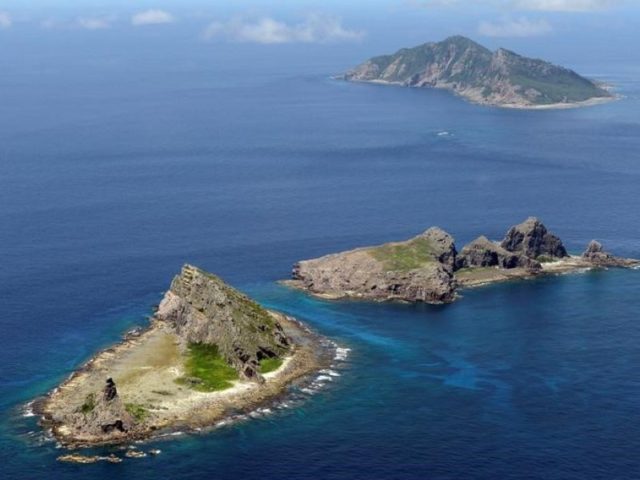The Chinese government sent three warships to sail within 12 nautical miles of Japan’s Senkaku Islands shortly after U.S. Secretary of Defense James Mattis concluded his visit to South Korea and Japan.
Beijing argues that the Senkakus — an uninhabited collection of islands in the East China Sea said to hold abundant oil resources — have belonged to China since “ancient times” and refers to the islands as the Diaoyu.
On Monday, three Chinese military ships sailed near the islands, a fact confirmed by U.S. defense sources, Japanese media, and the Chinese State Oceanic Administration. While the ships did not engage in any military activities while transiting, they did, reports confirm, enter Japanese sovereign territory. CNN cites Japanese news channel NHK as confirming that the Japanese government has issued an official protest against the maneuver with the Chinese Embassy in Tokyo.
Japan’s Coast Guard announced that China had committed 36 such transgressions in 2016. This passage through the East China Sea followed a reminder from Secretary of Defense Mattis that China did not have international law on its side when claiming the islands, however, a sign China will seek to defy Washington throughout President Donald Trump’s term.
Mattis spent the weekend in Japan, where he held a joint press conference with his Tokyo counterpart, Tomomi Inada. “I made clear that our long-standing policy on the Senkaku Islands stands – the US will continue to recognize Japanese administration of the islands and as such Article 5 of the US-Japan Security Treaty applies,” Mattis told reporters on Saturday. Article 5 of the bilateral treaty requires the United States to protect Japan when attacked by a foreign entity, as Japan’s post-World War II constitution does not permit it to maintain a standing military, only “self-defense forces.”
The United States and Japan also announced on Monday the successful testing of a new missile defense system in Hawaii. “The missile, developed jointly by a Japanese and US government and industry team, is vitally important to both our nations and will ultimately improve our ability to defend against increasing ballistic missile threats around the world,” Vice Adm. Jim Syring, director of the Missile Defense Agency, said. While the missile defense system will mostly likely be used to defend against a potential attack from North Korea, the defense forces of both nations may also employ the system to protect against new Chinese missile technology.
The visit to Asia last week was Mattis’s first trip abroad as America’s Secretary of Defense.
The Chinese government, both through official government offices and its official media outlets, has been sternly critical of Mattis’s support for Japan. “Diaoyu and its affiliated islands have been Chinese territory since ancient times,” spokesman Lu Kang told reporters in a statement following Mattis’s remarks in Tokyo. “We urge the US side to adopt a responsible attitude and stop making wrong remarks on the issue of the sovereignty of Diaoyu Islands.”
On Monday, spokesman Lu also accused the United States in veiled terms of exacerbating tensions in the South China Sea, where Japan does not have any territorial claims but China has usurped the territory of Taiwan, Brunei, Vietnam, the Philippines, and Malaysia. China has conducted six armed nautical passages through the international waters of the region so far in 2017.
“There is no trouble to speak of in the South China Sea. Thanks to the concerted efforts of China and relevant neighboring countries in the South China Sea, the situation on the sea is back to normal,” Lu asserted on Monday.
“The Diaoyu Island and its adjacent islets have been an inherent part of Chinese territory since ancient times, which is an unchangeable historical fact,” a column in the state-run publication Xinhua argued on Tuesday, “and the Chinese government has repeatedly warned that territorial issues are within the domain of its core interests.”
The Xinhua article goes on to warn that Mattis and the Trump administration are “actually risking turning the islands into a powder keg, thus making the issue more complicated and bringing instability to the region,” by support Japan’s claim to the islands.

COMMENTS
Please let us know if you're having issues with commenting.